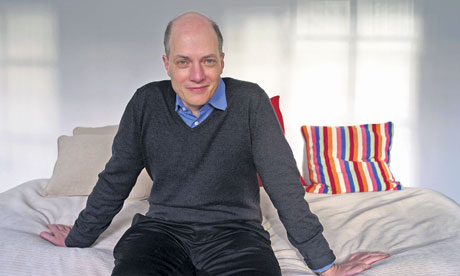Religion for Atheists
26th Jan 2012Listen to the audio
(full recording including audience Q&A)RSA Thursday
Has the endless debate between believers and non-believers finally hit a brick wall? Are secularists in danger of throwing the baby out with the bathwater when they reject religion and its trappings, or is it possible for non-believers to find consolation and beauty in ritual and tradition too?
Renowned philosopher Alain de Botton argues that despite the falsity of supernatural claims of religion, they still have very important things to teach the secular world.
Rather than mocking or deriding religions, agnostics and atheists should instead steal from them - because they're packed with good ideas on how to live and arrange our societies. De Botton proposes that we should look to the religious tradition for insights into how to build a sense of community, make our relationships last, get more out of art, overcome feelings of envy and inadequacy, and much more.
Chair: Matthew Taylor, chief executive, RSA.
* * * * * * *
In response to the above conversation, Jonathan Rowson offers a criticism of De Botton's thesis. This also comes from the RSA - and Rowson also includes my all-time favorite parable from The West Wing.Religion for Atheists: What is the ‘it’ that De Botton doesn’t seem to ‘get’ ?
February 2, 2012 by Jonathan RowsonI have been a big fan of Alain De Botton for a number of years, and have enjoyed many of his books. As an undergraduate I was excited by the very title ‘How Proust can Change your Life‘, before I had even heard of ‘Prooost’, and I remember a diagram on the improbability of a couple meeting on an aeroplane, I think in ‘Essays in Love‘, that made me ponder the idea of fate more deeply than I ever had before. I am also a fan of The School of Life, which he inspired, and broadly support his considerable efforts to make philosophy, non-academically conceived, more engaging, accessible, and, frankly, enjoyable.
I believe Status Anxiety was by far his most powerful contribution. He gave name and form to a pervasive felt sense that constantly eats away at people, and elucidated the individual craving for ‘love from the world’ which pervades almost every aspect of modern life. (On a personal level, I related to the idea as a chess Grandmaster because the chess rating system functions as such a tangible status metric).
I didn’t get much out of The Pleasures and Sorrows of Work although it was such a beautifully designed and produced book that I kept expecting to, and enjoyed travelling hopefully. And now I am struggling a bit with Religion for Atheists, which he spoke about at the RSA last week.
Richard Holloway, one of the wisest thinkers in the country, seemed to value the book, which gave me pause, especially because he felt it would be most appreciated by “uneasy believers” who would “welcome it like a well of water in a dry place.” In other words De Botton’s reappraisal of religion is thought to be deep and sophisticated enough to revitalise moribund traditions, by reminding them that the true sources of their value are not, and never have been, wedded to doctrine. (Karen Armstrong makes a similar point in The Case for God).
So what’s the problem? Why do I feel, as I recently tweeted, that De Botton doesn’t ‘get it’? As Emma recently wrote, and Cognitive Media beautifully illustrated ”Without a properly articulated framework of values, his arguments for why atheists should grab a bit of religion just don’t stand up.” But that’s just part of the story. Something deeper is bugging me.
I felt a similar dissatisfaction when he interviewed Chief Rabbi Jonathan Sacks (about eight and a half minutes in) and it was related to De Botton’s somewhat promiscuous attitude to ideas. In essence he argues that the value in not subscribing to any particular tradition is that an individual can freely ‘pick and mix’ from all the available ideas and thereby come upon those ideas that suit their needs and interests at a given point in time.
This is not a religious position, but you might call it De Botton’s ‘Life stance’ which is an increasingly popular term used to describe people’s spiritual position, or perspective on how the way they live their lives relates to matters of fundamental concern. (‘a properly articulated framework of values’, even).
My concern for this position is that it doesn’t acknowledge the positional nature of depth, of the need to stick with something even when you don’t like it and it’s not working for you.
De Botton is surely right that you can experience depth in a variety of settings without religious commitment- there is depth in art, architecture, music, literature etc. But I wonder if the kinds of existential challenges we face can be adequately dealt with in this relatively piecemeal fashion. For instance, why read the Bible for insight into human experience when you could read Shakespeare? Why pray to an unknowable God when you could just enjoy the aesthetic power of the sunset?
I think there is an answer, and it relates to a story I came upon from a less revered but much enjoyed cultural resource, the WestWing:
“This guy’s walking down the street when he falls in a hole. The walls are so steep he can’t get out.”
A doctor passes by and the guy shouts up, ‘Hey you. Can you help me out?’ The doctor writes a prescription, throws it down in the hole and moves on.
“Then a priest comes along and the guy shouts up, ‘Father, I’m down in this hole can you help me out?’ The priest writes out a prayer, throws it down in the hole and moves on.
“Then a friend walks by, ‘Hey, Joe, it’s me can you help me out?’ And the friend jumps in the hole.
Our guy says, ‘Are you stupid? Now we’re both down here.’
The friend says, ‘Yeah, but I’ve been down here before and I know the way out.’”
The idea that ‘I have been here before’ and ‘I know the way out’ is what I mean by positional depth in this context. In the context of a shared tradition we recognise similar human needs that are culturally embedded and socially constituted, in a way we cannot by a personal pick and mix approach.
The integrity of a religious tradition is that it places obstacles in your path that you are obliged to overcome on that path if you want to grow, and cannot eschew by casually rejecting the path and going on to another. I don’t quite feel I have nailed it, but I think this might be the ‘it’ that De Botton doesn’t seem to ‘get’.
* * * * * * *
Finally, here is an article from The Guardian (UK), the article is based on an interview.Read the whole article.Alain de Botton: a life in writing
'The nirvana would be if the questions raised by Oprah Winfrey would be answered by the faculty at Harvard'guardian.co.uk, Friday 20 January 2012De Botton: 'Is the purpose of rocket science to ask questions about rockets?'Photograph: Eamonn McCabe"My dad was a slightly stricter version of Richard Dawkins," says Alain de Botton. "The worldview was that there are idiots out there who believe in Santa Claus and fairies and magic and elves and we're not joining that nonsense." In his new book, Religion for Atheists, he recalls his father reducing his sister Miel to tears by "trying to dislodge her modestly held notion that a reclusive god might dwell somewhere in the universe. She was eight at the time." It's one of few passages in his unremittingly mellifluous and genteel oeuvre that sticks out with something like anger.Before the interview, his publicists warned that De Botton didn't want to talk about Gilbert de Botton, Egyptian-born secular Jew and multimillionaire banker. He was especially keen not to discuss his father's business dealings and the repeated suggestion that his literary career was bankrolled with daddy's money.But asking about De Botton's father is irresistible because Religion for Atheists is, he readily concedes, an oedipal book. "I'm rebelling," he says. "I'm trying to find my way back to the babies that have been thrown out with the bathwater." He's elsewhere described his father as "a cruel tyrant as a domestic figure, hugely overbearing". He was also surely crushingly impressive – the former head of Rothschild Bank who established Global Asset Management in 1983 with £1m capital and sold it to UBS in 1999 for £420m, a collector of late Picassos, the austere figure depicted in portraits by both Lucian Freud and Francis Bacon and an atheist who thrived without religion's crutch."He was extreme. I think it was a generational thing." And yet Gilbert, who died in 2000, now lies beneath a Hebrew headstone in a Jewish cemetery in Willesden, north-west London because, as his son writes pointedly, "he had, intriguingly, omitted to make more secular arrangements".Disappointingly, Alain doesn't explore in book or interview what intrigued him about that omission.
Instead, he connects his father's militant atheism to the affliction that he reckons made Dawkins and Christopher Hitchens so caustic in their bestselling attacks on religion. "I've got a generational theory about this. Particularly if you're a man over 55 or so, perhaps something bad happened to you at the hands of religion – you came across a corrupt priest, you were bored at school, your parents forced it down your throat. Few of the younger generation feel that way. By the time I came around – I'm 42 – religion was a joke."I don't think I would have written this book if I'd grown up in Saudi Arabia as a woman. It's a European book in the sense that we're living in a society where religion is on the back foot. It rarely intruded on my life."This isn't quite true. In his mid 20s, De Botton had a crisis of faithlessness when exposed to Bach's cantatas, Bellini's Madonnas and Zen architecture. What was the crisis about? "It was guilt about my father. I was disturbed by the intensity of the feeling. Bach was moving, but not just because of music but because this guy was talking in a tremulous voice about death. Secular culture tells us to respect Bach, but it doesn't tell us that we're going to be moved. I felt like I might go to the other side."He didn't. Rather, in Religion for Atheists, he writes as a non-believer cherry-picking the world's religions. "I guess my insight was: 'What is there here that's useful, that we can steal?'"
There's more to read at The Guardian on De Botton.
-
More on this story
-
The digested read
Religion for Atheists by Alain de Botton: What was Christ's crucifixion but an existential dilemma? Viewed through this perspective, the secular can once more reclaim the Sistine Chapel as a symbol of male midlife crisis
- Religion for Atheists reviewed by the Reverend Richard Coles
- Religion for Atheists reviewed by Terry Eagleton




No comments:
Post a Comment